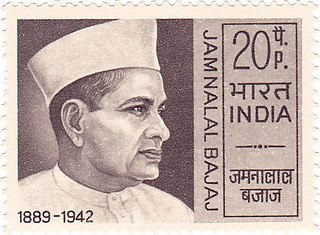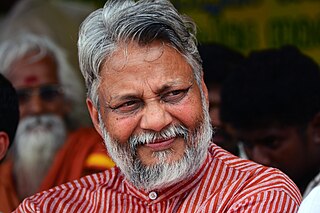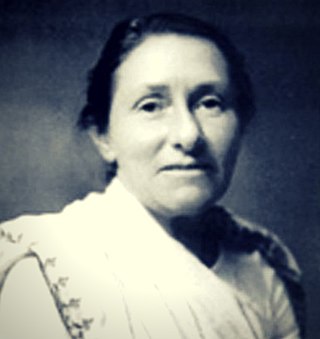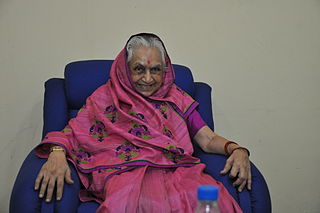
Murlidhar Devidas Amte, popularly known as Baba Amte, was an Indian social worker and social activist known particularly for his work for the rehabilitation and empowerment of people suffering from leprosy. He has received numerous awards and prizes including the Padma Vibhushan, the Dr. Ambedkar International Award, the Gandhi Peace Prize, the Ramon Magsaysay Award, the Templeton Prize and the Jamnalal Bajaj Award. He is also known as the modern Gandhi of India.

Sunderlal Bahuguna Ji was an Indian environmentalist and Chipko movement leader. The idea of the Chipko movement was suggested by his wife and him. He fought for the preservation of forests in the Himalayas, first as a member of the Chipko movement in the 1970s, and later spearheaded the anti-Tehri Dam movement from the 1980s to early 2004. He was one of the early environmentalists of India, and later he and others associated with the Chipko movement and started taking up wider environmental issues, such as being opposed to large dams.

Jayaprakash Narayan, popularly referred to as JP or Lok Nayak, was an Indian independence activist, theorist, socialist and political leader. He is remembered for leading the mid-1970s opposition against Prime Minister Indira Gandhi, for whose overthrow he had called for a "total revolution". His biography, Jayaprakash, was written by his nationalist friend and the writer of Hindi literature, Rambriksh Benipuri. In 1999, he was posthumously awarded the Bharat Ratna, India's highest civilian award, in recognition of his social service. Other awards include the Magsaysay award for Public Service in 1965.

The Chipko movement is a forest conservation movement in India.

Rajmohan Gandhi is an Indian biographer, historian, and research professor at the Center for South Asian and Middle Eastern Studies, University of Illinois at Urbana-Champaign, US. His paternal grandfather is Mahatma Gandhi, and his maternal grandfather is Chakravarthi Rajagopalachari. He is also a scholar in residence at the Indian Institute of Technology Gandhinagar.

Jamnalal Kaniram Bajaj was an Indian industrialist. He founded the Bajaj Group of companies in the 1920s, and the group now has 24 companies, including six that are listed on the bourses. He was also a close and beloved associate of Mahatma Gandhi, who is known to have often declared that Jamnalal was his fifth son.

Rajendra Singh is an Indian water conservationist and environmentalist from Alwar district, Rajasthan in India. Also known as "waterman of India", he won the Magsaysay Award in 2001 and Stockholm Water Prize in 2015. He runs an NGO called 'Tarun Bharat Sangh' (TBS), which was founded in 1975. The NGO based in village hori-Bhikampura in Thanagazi tehsil, near Sariska Tiger Reserve, has been instrumental in fighting the slow bureaucracy, mining lobby and has helped villagers take charge of water management in their semi-arid area as it lies close to Thar Desert, through the use of johad, rainwater storage tanks, check dams and other time-tested as well as path-breaking techniques. Starting from a single village in 1985, over the years TBS helped build over 8,600 johads and other water conservation structures to collect rainwater for the dry seasons, has brought water back to over 1,000 villages and revived five rivers in Rajasthan, Arvari, Ruparel, Sarsa, Bhagani and Jahajwali. He is one of the members of the National Ganga River Basin Authority (NGRBA) which was set up in 2009, by the Government of India as an empowered planning, financing, monitoring and coordinating authority for the Ganges (Ganga), in exercise of the powers conferred under the Environment (Protection) Act, 1986. In the UK he is a founder member of an NGO called the Flow Partnership. which aims to counter the negative effects of soil erosion and flooding.

Banwari Lal Joshi was an Indian civil servant and government official who was Governor of the Indian state of Uttar Pradesh from 2009 to 24 June 2014. He was previously Lieutenant-Governor of Delhi from 2004 to 2007, Governor of Meghalaya in 2007, and Governor of Uttarakhand from October 2007 to July 2009.

Sanjit "Bunker" Roy is an Indian social activist and educator who founded the Barefoot College. He was selected as one of Time 100's 100 most influential personalities in 2010 for his work in educating illiterate and semi literate rural Indians. Roy was awarded the Padma Shri by Giani Zail Singh in 1986.
Gokulbhai Daulatram Bhatt born in Hathal (Sirohi) was a freedom fighter and a social worker from Rajasthan state in India. He was a member of Constituent Assembly of India representing Bombay State and chief minister of princely Sirohi state for a brief period.

Dr. Shekhar Pathak is a historian, editor, publisher, activist, and traveller from Uttarakhand, India. He is known for his extensive knowledge of the history of colonial and postcolonial social movements and contemporary environmental and social issues in Uttarakhand, and colonial exploration in the Himalayas and Tibet. He has also been engaged in activism for various social and environmental causes since the 1970s.
Dr. Mandan Mishra was a noted Sanskrit scholar from India and founder of Shri Lal Bahadur Shastri Rashtriya Sanskrit Vidyapeetha. In 2000 he was awarded Padma Shri by Government of India for his excellent and devoted work in the field of Sanskrit.

A taanka or paar, also known as a tanka or paar, is a traditional rainwater harvesting technique, common to the Thar desert region of Rajasthan, India. It is meant to provide drinking water and water security for a family or a small group of families. A taanka is composed of a covered, underground, impermeable cistern on shallow ground for the collection of rainwater. The cistern is generally constructed out of stone or brick masonry, or concrete, with lime mortar or cement plaster. Rainwater or surface run-off from rooftops, courtyards, or artificially prepared catchments flow into the tank through filtered inlets in the wall of the pit.

Water Literacy Foundation is a non-governmental environmental organisation based in Bangalore, Karnataka, whose high goal is to make India a "water-efficient nation" by raising awareness about water scarcity and establishing rainwater harvesting in all areas of India.

Sarala Behn was an English Gandhian social activist whose work in the Kumaon region of India helped create awareness about the environmental destruction in the Himalayan forests of the state. She played a key role in the evolution of the Chipko Movement and influenced a number of Gandhian environmentalists in India including Chandi Prasad Bhatt, Bimala behn and Sunderlal Bahuguna. Along with Mirabehn, she is known as one of Mahatma Gandhi's two English daughters. The two women's work in Garhwal and Kumaon, respectively, played a key role in bringing focus on issues of environmental degradation and conservation in independent India.
Gutta Muniratnam was an Indian social worker, a member of the National Planning Commission of India and the founder of Rashtriya Seva Samithi (RASS), a non governmental organization engaged in the social welfare activities in over 2500 socio-economically backward villages in the Rayalaseema region, spread across the present day states of Andhra Pradesh and Telangana. He was honored by the Government of India, in 2012, with the fourth highest Indian civilian award of Padma Shri.
Chunibhai Vaidya, popularly called Chunikaka, was an activist and Gandhian from Gujarat, India.

Sarala Birla was an Indian Businesswoman prominent member of the Birla family of Indian industrialists. She took interest in public education and, along with her husband, is credited with having co-founded about 45 educational institutions supported by her family's conglomerate.

Rabindra Nath Upadhyay (1923–2010) was an Indian social worker, Gandhian and the founder of Tamulpur Anchalik Gramdan Sangha (TAGS), a non governmental organization working for the social development of the rural people in the Kumarikata village of Assam. He was a recipient of the 2003 Jamnalal Bajaj Award. The Government of India awarded him the fourth highest civilian award of the Padma Shri, in 2000, for his services to the society.

Dr. Anil Prakash Joshi is an environmentalist, green activist, and the founder of Himalayan Environmental Studies and Conservation Organization (HESCO), a Dehradun-based voluntary organization. His work majorly includes developing sustainable technologies that are ecology inclusive economy for ecosystem development. He has coined GEP, an ecological growth measure parallel to GDP. GEP has been accepted as a growth measure by the state of Uttarakhand on 5 June 2021. He was selected as the man of the year by Week Magazine in 2003. He is a recipient of the Jamnalal Bajaj Award and is an Ashoka Fellow. The Government of India awarded him the fourth highest civilian honour of the Padma Shri, in 2006, for his contributions to Indian society. He was also awarded Padma Bhushan, third highest civilian award in 2020 for environmental conservation in Uttarakhand. Dr. Joshi appeared in the Kaun Banega Crorepati, Karamveer episode aired on 25th December 2020.
















